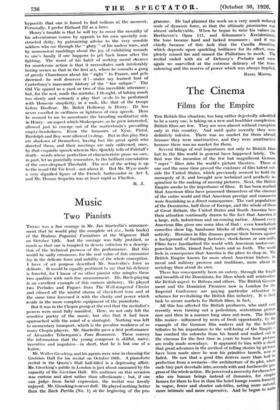Music Two Pianists
THERE was a fine courage in Mr. Jan Sineterlin's announce- ment that he would play the complete set (i.e., both books) of the Brahms Paganini Variations at the Wigmore Hall on October 12th. And the courage was fully justified, so much so that one is tempted to devote criticism to a descrip- tion of the technical prowess of the performance. But this would be sadly erroneous, for the real value of this encounter lay in the delicate force and nobility of the whole conception. I have of set purpose described Mr. Smeterlin's force as delicate. It would be equally pertinent to say that his delicacy is forceful, for I know of no other pianist who mingles these two qualities with such fine measurement. His Bach-playing is an excellent example of this curious alchemy. He played two Preludes and Fugues from The Well-tempered Clavier and educed all the wistful charm of clavichord tone and at the same time leavened it with the clarity and power which reside in the more complete equipment of the pianoforte.
But it was in the Chopin group at the end that the recitalist's powers were most fully manifest. Here, we not only felt the sensitive poetry of the music, but also that it had been approached with the mind of a strategist. Nothing was left to momentary transport, which is the peculiar weakness of so many Chopin players. Mr. Smeterlin gave a first performance of Alexander Teherepnin's Four Romances. • These convey the information that the young composer is skilful, naive, inventive and impulsive—in short, that he is but one of a legion.
Mr. Walter Gieseking and his agents were wise in choosing the Grotrian Hall for his recital on October 19th. A pianoforte ireital in the Queen's Hall half-filled is a depressing affair. Mr. Gieseking's public in London is just about measured by the capacity of the Grotrian Hall. His audience on this occasion was curious and alert rather than affectionate ; but, if one can judge from facial expression, the recital was keenly enjoyed. Mr..Gieseking is never dull. He played nothing better than the Bach Partita (No. 1) at the beginning of the pro- gramme. He had planned the work on a very much reduced scale of dynamic force, so that the ultimate pianissimo was almost unbelievable. When he began to raise his values (in Beethoven's Opus 111, and Schumann's Kreisleriana), the tone became hard and lacked resonance ; and it was chiefly because of this lack that the Casella Sonatina, which depends upon sparkling brilliance for its effect, coin. pletely missed fire and caused the Philistines to mock. The recital ended with six of Debussy's Preludes and once again we marvelled at the extreme delicacy of the tone. colouring and the reserve of power which was always implied.
BASIL MAINE.


























































 Previous page
Previous page